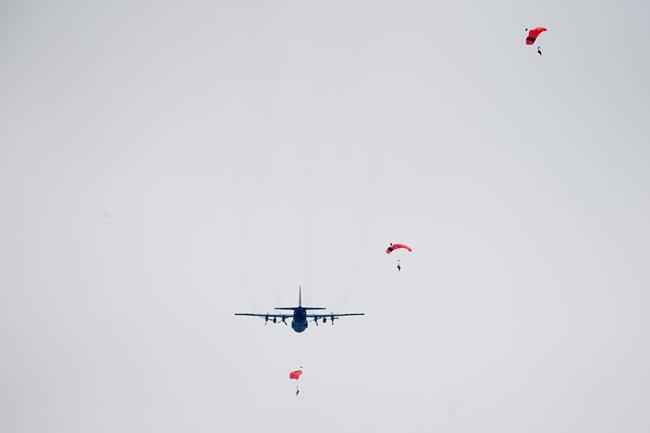Military members feeling bite of skyrocketing housing, living costs: defence chief
Advertisement
Read this article for free:
or
Already have an account? Log in here »
To continue reading, please subscribe:
Monthly Digital Subscription
$0 for the first 4 weeks*
- Enjoy unlimited reading on winnipegfreepress.com
- Read the E-Edition, our digital replica newspaper
- Access News Break, our award-winning app
- Play interactive puzzles
*No charge for 4 weeks then price increases to the regular rate of $19.00 plus GST every four weeks. Offer available to new and qualified returning subscribers only. Cancel any time.
Monthly Digital Subscription
$4.75/week*
- Enjoy unlimited reading on winnipegfreepress.com
- Read the E-Edition, our digital replica newspaper
- Access News Break, our award-winning app
- Play interactive puzzles
*Billed as $19 plus GST every four weeks. Cancel any time.
To continue reading, please subscribe:
Add Free Press access to your Brandon Sun subscription for only an additional
$1 for the first 4 weeks*
*Your next subscription payment will increase by $1.00 and you will be charged $16.99 plus GST for four weeks. After four weeks, your payment will increase to $23.99 plus GST every four weeks.
Read unlimited articles for free today:
or
Already have an account? Log in here »
Hey there, time traveller!
This article was published 14/04/2022 (1339 days ago), so information in it may no longer be current.
OTTAWA – Canada’s top military commander says his troops are feeling the sharp bite of skyrocketing housing prices and other costs of living due to their unique lifestyles, and more housing on Canadian Armed Forces bases is needed.
Gen. Wayne Eyre said Thursday that a lack of affordable housing and growing difficulties making ends meet have emerged as top complaints from Armed Forces personnel to senior leaders.
“The number 1 issue that comes up as I travel around the country is cost of living and the challenges our people are facing in terms of finding affordable accommodations,” Eyre said during a breakfast event hosted by Ottawa Mayor Jim Watson.

The chief of defence staff said while many Canadians are facing the same challenges, the impacts are particularly acute on members of the Canadian military, who are frequently required to move to different bases and locations across the country.
An internal report by the military’s morale and welfare unit in 2018 found one in four Armed Forces members are required to relocate every year due to training or operational needs.
Eyre took special aim at what he described as a shortage of housing on military bases.
“Now we’re somewhere in the neighbourhood of 4,000 to 6,000 units short on our bases, which is also accentuating the housing problem,” he said.
An internal Defence Department report on military housing published in December said there were around 12,000 units across the country, which provided accommodation to about 20 per cent of Armed Forces members.
While occupancy rates in different places vary, the report found housing was near capacity, particularly as between 10 to 15 per cent of all units are unavailable at any given time due to maintenance or other reasons.
The report also found that a special allowance called the post-living differential (PLD) established to offset the added costs service members face in more expensive communities is falling short as the current rate has been frozen since 2009.
“The inability of the PLD to keep pace with market fluctuations is limiting its support to housing affordability,” the report said.
Eyre identified the cost of living concerns and lack of affordable accommodation as challenging the military’s ability to retain trained and experienced personnel, which has emerged in the past few years as a key issue.
The Canadian Armed Forces is currently short thousands of members, a fact Eyre highlighted during his breakfast address, in which he warned the military has been “stretched pretty thin.”
Many Armed Forces members are exhausted from the unrelenting tempo of the past two years, Eyre said, which has included supporting Canadians throughout the COVID-19 pandemic while responding to natural disasters and events overseas.
Those include Russia’s invasion of Ukraine, with Defence Minister Anita Anand announcing the deployment of up to 150 Armed Forces members to Poland on Thursday to help with the refugee crisis there. It is the latest addition to a growing list of deployments to Europe.
Eyre also noted that while Russia is currently top of mind, concerns about Chinese aggression in the Indo-Pacific region have not gone away, while extremist groups and even climate change remain ever present.
The rising number of threats and demands at home and abroad have come at the same time as pandemic restrictions have limited recruitment and training, and allegations of sexual misconduct against senior officers have shaken the military’s image.
All of this has underscored the importance of changing the military’s culture to make it a more attractive workplace, Eyre said, but also the urgent need to keep or retain those already in uniform.
“We’ve got to work harder and we’ve got to work faster because the international security environment is demanding it,” he said. “A dangerous, uncertain future looms and it’s not going to wait for us to be ready. So we have to be ready now.”
This report by The Canadian Press was first published April 14, 2022.


